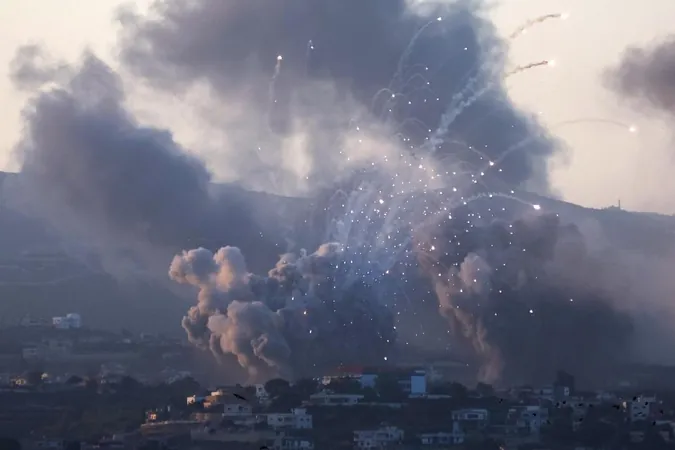
Escalation of Air Strikes: 274 Lives Lost as Tensions Between Israel and Hezbollah Surged!
2024-09-23
In a dramatic escalation of the ongoing conflict, Israel conducted its most extensive air strike campaign against Hezbollah targets in southern Lebanon on September 23, resulting in the tragic deaths of at least 274 people, according to Lebanese health officials. This incident marks the deadliest day in Lebanon since the renewed hostilities began nearly a year ago.
As the exchange of fire became increasingly intense, Israeli authorities issued urgent evacuation warnings to civilians residing in areas purportedly used by Hezbollah to store weapons. Prime Minister Benjamin Netanyahu, addressing the nation, described the current situation as a time of "complicated days," urging unity among Israelis as air operations intensified.
"I promised to change the security balance in the north, and that is exactly what we are achieving," Netanyahu stated during a military assessment in Tel Aviv. The Israeli military has reported that over 300 Hezbollah targets have been struck, with allegations that these strongholds include weapons stored in civilian homes, although independent verification of such claims is lacking.
In retaliation, Hezbollah announced it had fired rockets at Israeli military positions along the border. The Israeli military has been preparing for further strikes, particularly targeting strategic weapons allegedly concealed in residential areas of Lebanon’s Bekaa Valley, prompting additional evacuation advisories.
Rear-Admiral Daniel Hagari, speaking to the press, described scenes from southern Lebanon where explosions from Hezbollah's weaponry were visible, claiming they were stored within homes intended for assaults against Israeli civilians. "In every house we are attacking, there are weapons. We will continue our operations as planned to ensure the safety of residents in the north," he asserted.
The recent air strikes not only inflicted heavy casualties but also intensified pressure on Hezbollah, which faced severe losses in recent days. The group contended with unprecedented challenges, including an attack that resulted in the malfunction of thousands of communication devices used by its operatives—a development widely attributed to Israeli intelligence efforts.
The precarious situation is threatening to embroil the broader region, raising alarms that the conflict could drag in major powers such as the United States and Iran. Iran's government has condemned the latest Israeli actions, warning of dire consequences for what they describe as a reckless “new adventure” by Israeli forces.
On the ground in Lebanon, the fallout has been significant. The Lebanese Interior Minister announced that shelters in schools across Beirut, Tripoli, and southern regions have opened to accommodate those displaced by the renewed violence. Reports have indicated over 80,000 automated calls urging residents to evacuate their homes, though not everyone received or responded to the warnings.
Minister Ziad Makary underscored the psychological dimension of the conflict, dismissing evacuation orders from Israel as mere psychological warfare. Concerns among the populace are palpable, with fear that Hezbollah may retaliate strongly, prompting a full-scale war. Citizens in affected neighborhoods expressed feelings of helplessness as military operations unfold.
As tensions heighten, the potential for an all-out conflict looms. Local business owners and residents are increasingly vocal about their anxieties. One shopkeeper in Beirut remarked, "If they want war, what can we do? It was imposed on us. We cannot do anything."
As the situation develops, leaders on both sides remain at an impasse, with Israeli defense officials emphasizing their commitment to a comprehensive military plan. The return of evacuated residents to their homes safely has become a top priority for the Israeli government amid the chaos, but with the situation volatile, a resolution appears increasingly distant.
Stay tuned as we continue to cover this evolving story and its implications for regional stability.




 Brasil (PT)
Brasil (PT)
 Canada (EN)
Canada (EN)
 Chile (ES)
Chile (ES)
 España (ES)
España (ES)
 France (FR)
France (FR)
 Hong Kong (EN)
Hong Kong (EN)
 Italia (IT)
Italia (IT)
 日本 (JA)
日本 (JA)
 Magyarország (HU)
Magyarország (HU)
 Norge (NO)
Norge (NO)
 Polska (PL)
Polska (PL)
 Schweiz (DE)
Schweiz (DE)
 Singapore (EN)
Singapore (EN)
 Sverige (SV)
Sverige (SV)
 Suomi (FI)
Suomi (FI)
 Türkiye (TR)
Türkiye (TR)